It was a busy month for me, which translated to less reading overall, and while the books I read were fine, there were no standouts. But just because none of these titles were 5-star reads for me doesn’t mean they aren’t exactly what you are currently looking for in your reading life. Let’s get to the reviews so you can find out for yourself if any of these titles are your potential next reads.
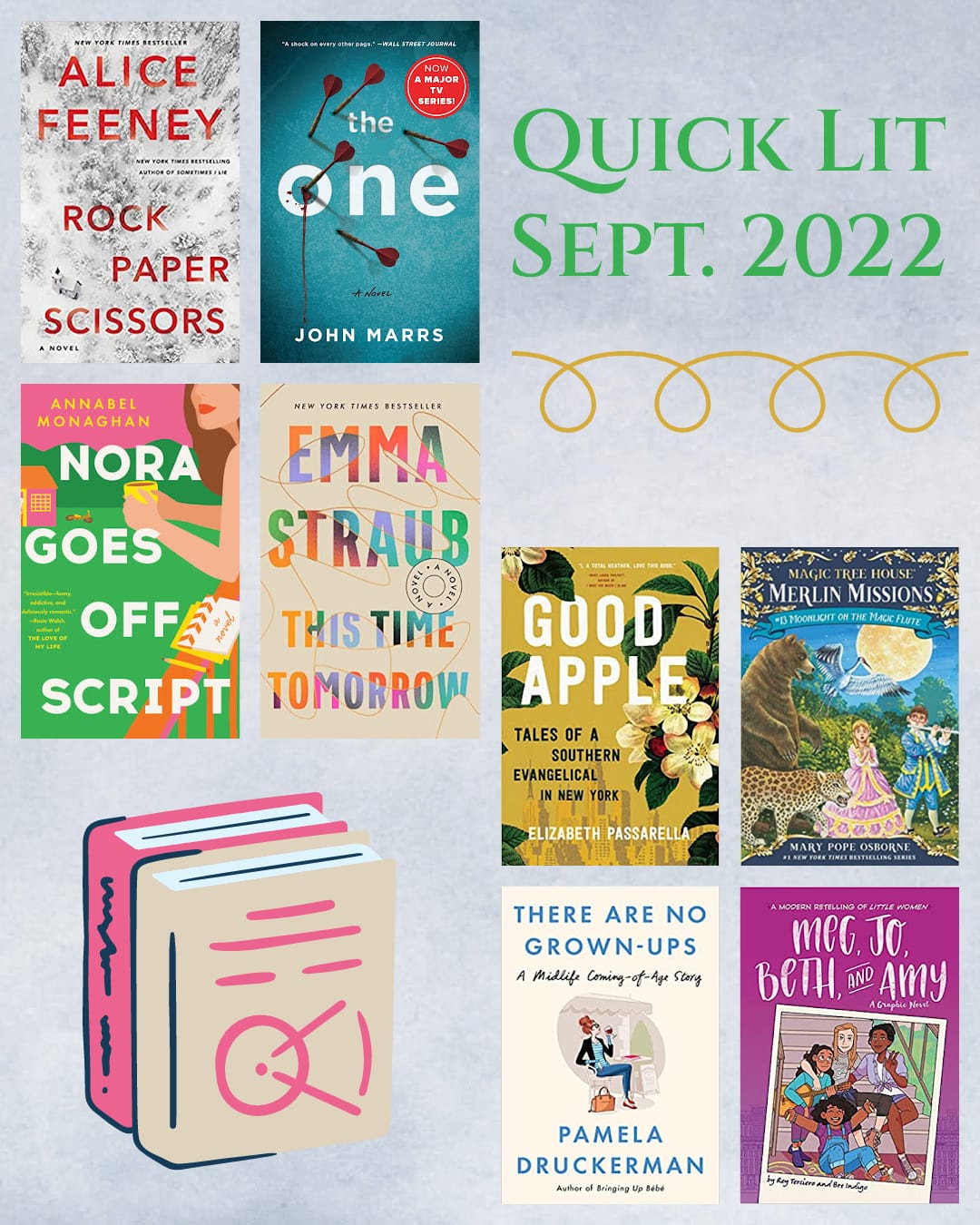
NONFICTION
There Are No Grown-Ups: A Mid-Life Coming-of-Age Story, by Pamela Druckerman: Pamela Druckerman introduced an entire generation of American parents to a whole new (to us) philosophy and approach to parenting in her first book about parenting French children as an American-born mother. In this second collection of autobiographical essays, Druckerman moves beyond the realms of culture and parenting to explore more of life, namely MID-life.
When Druckerman turned forty, she suddenly realized that she was no longer catching men’s attention as she once had. Others no longer seemed shocked by the fact that she had birthed three children, and shopkeepers had given up calling her mademoiselle, trading it in for the more seasoned “Madame.” In some ways she did feel older, but in other ways she was still waiting to come to terms with having “grown up” while realizing that sometimes those feelings never actually manifest. Through lighthearted anecdotes, heavier reminiscences, and insightful cultural commentary, Druckerman explores the ins and outs of this often-overlooked decade of life. She touches on everything from body changes to social maturity, the uncomfortable realities of existing within the sandwich generation (with ailing parents and still-dependent children), and the reconciling of youthful proclivities with middle-aged foresight and responsibilities.
This was one of MANY books I inadvertently picked up this month that explored life just before or after forty; this book was more explicit in its examination of this stage of life, and it made for a helpful companion to the novels and other memoir I read that existed within this demographic. Though I’m still two years away from my fortieth birthday, I could relate to quite a bit of Druckerman’s experiences and especially enjoyed the “You know you’re in your forties when. . .” statements that end each chapter. I appreciated Druckerman’s matter-of-fact stance on aging and her ability to find humor and hope in this stage of life, and I really enjoyed her takeaways on how to grow into self-awareness, potential, healthy relationships, and emotional regulation.
Where Druckerman lost me, though, was in the novel’s pretentious tone. The not-so-subtle showcasing of her French sophistication and previous writing success grew tedious. And the casual spilling of extramarital dalliances and the play-by-play of the threesome that was her husband fortieth birthday present was just too much for me. I’m not sure if she was going for relatability or shock value with this; my reaction was mostly just one of disgust.
Though Druckerman has much wisdom to offer, and I do appreciate her candor, I ended the book wishing she’d brought just a little more of her “grown-up-ness” (or at least her attempts at it) to the page.
My Rating: 3.25 Stars // Book Format: Audiobook
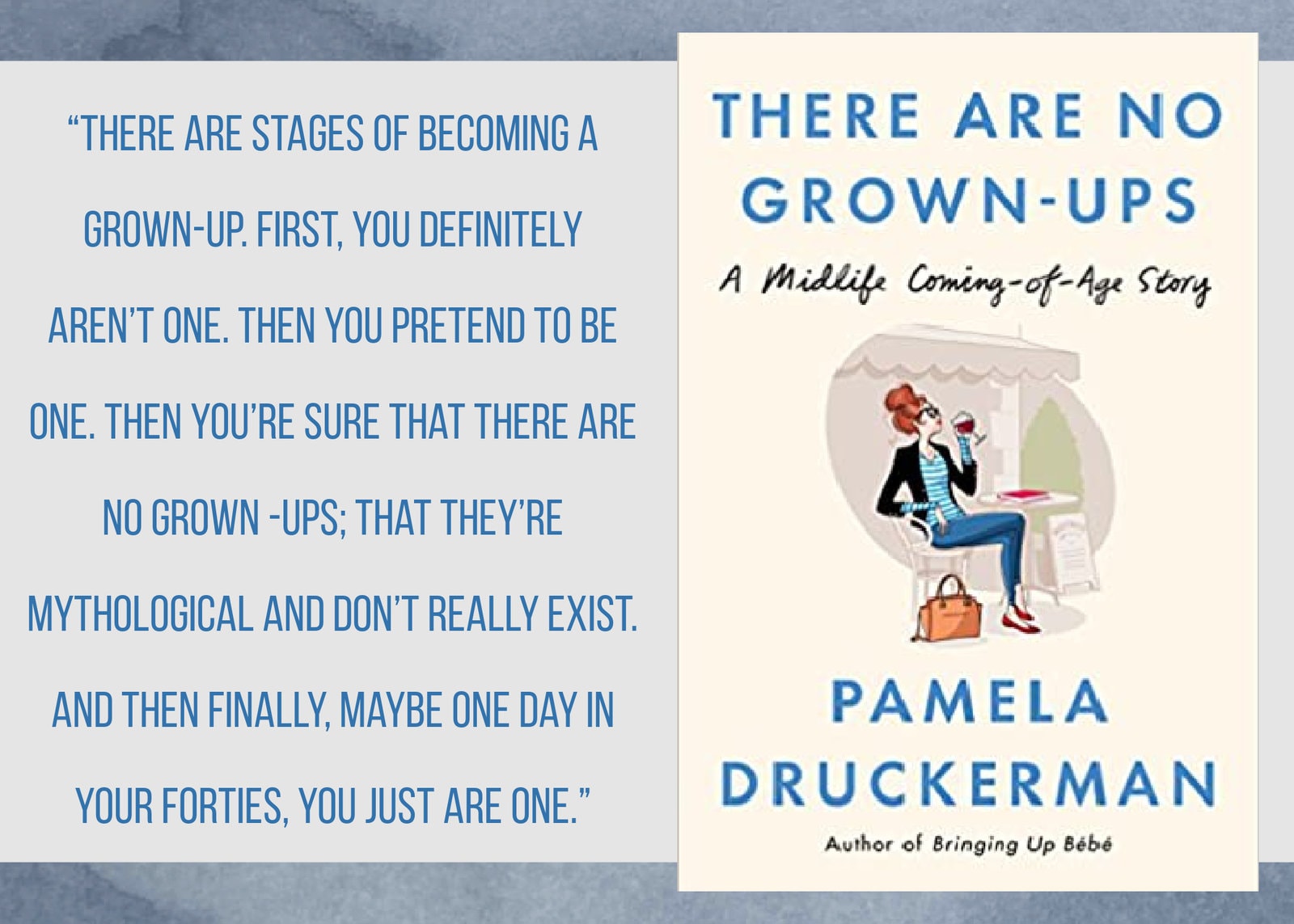
Good Apple: Tales of a Southern Evangelical in New York, by Elizabeth Passarella: A Southern-born Christian girl moves to New York City where she falls in love (with both the city and her soon-to-be-husband) and becomes a Democrat. It sounds like the start of a romantic comedy, or maybe even a joke, but it’s the 100% true story of Elizabeth Passarella, A Christian Democrat (nope, that’s not an oxymoron!) living in NYC with her husband and three children. In this humorous essay-style memoir, Passarella shares about her southern upbringing with a Jewish father and Christian mother, and how that upbringing is remarkably different from the one she is providing her own city-dwelling children. Passarella dishes on apartment life with children (the wonderful AND the challenging), the circuitous path to meeting and marrying her husband, her slow slide into becoming a Democrat (much to her mother’s horror), her reconciliation of Christian beliefs with her father’s Judaism, and more.
Pasarella isn’t afraid to ruffle feathers, and her refusal to fit into tidy categories (in both her life and her book) is both what makes this memoir stand out and also what may keep it from being a home run for many readers. While I was impressed with the author’s adherence to strong Christian values (she doesn’t waiver on these, even though they are unpopular with her secular, nonreligious NYC peers) and her ability to speak respectfully about other groups without fully agreeing with them, I felt her tone towards Christians who have followed a more traditional political/life choice route to be occasionally patronizing. (I can’t speak for non-Christian Democrats reading this book, as I am not in that demographic, though I have a feeling there are moments where the tone comes across as patronizing to them as well.) I also didn’t love her obvious attempts to prove she genuinely fits in with both camps (“I AM a Christian, and I AM a Democrat—let me show you!”); I can understand this defensive posturing, but it made for some uncomfortable moments in the book.
Overall, though, I really enjoyed this. Pasarella makes some very valid and thought-provoking points about Christianity and politics, with insights only an “insider/outsider” could glean, and she is a fun and engaging storyteller. I appreciated both her heart and her glimpses into cultures quite different from my own. (My favorite aspect of the book was descriptions of raising a family in the city, which brought Shauna Niequists’s latest book to mind.) It was a delight to see the unique ways Pasarella’s southern charm, manners, and values have managed to survive while nearly everything about her life has changed, and I love that she is shining light in a city that could use a little more Jesus!
My Rating: 4 Stars // Book Format: Audiobook
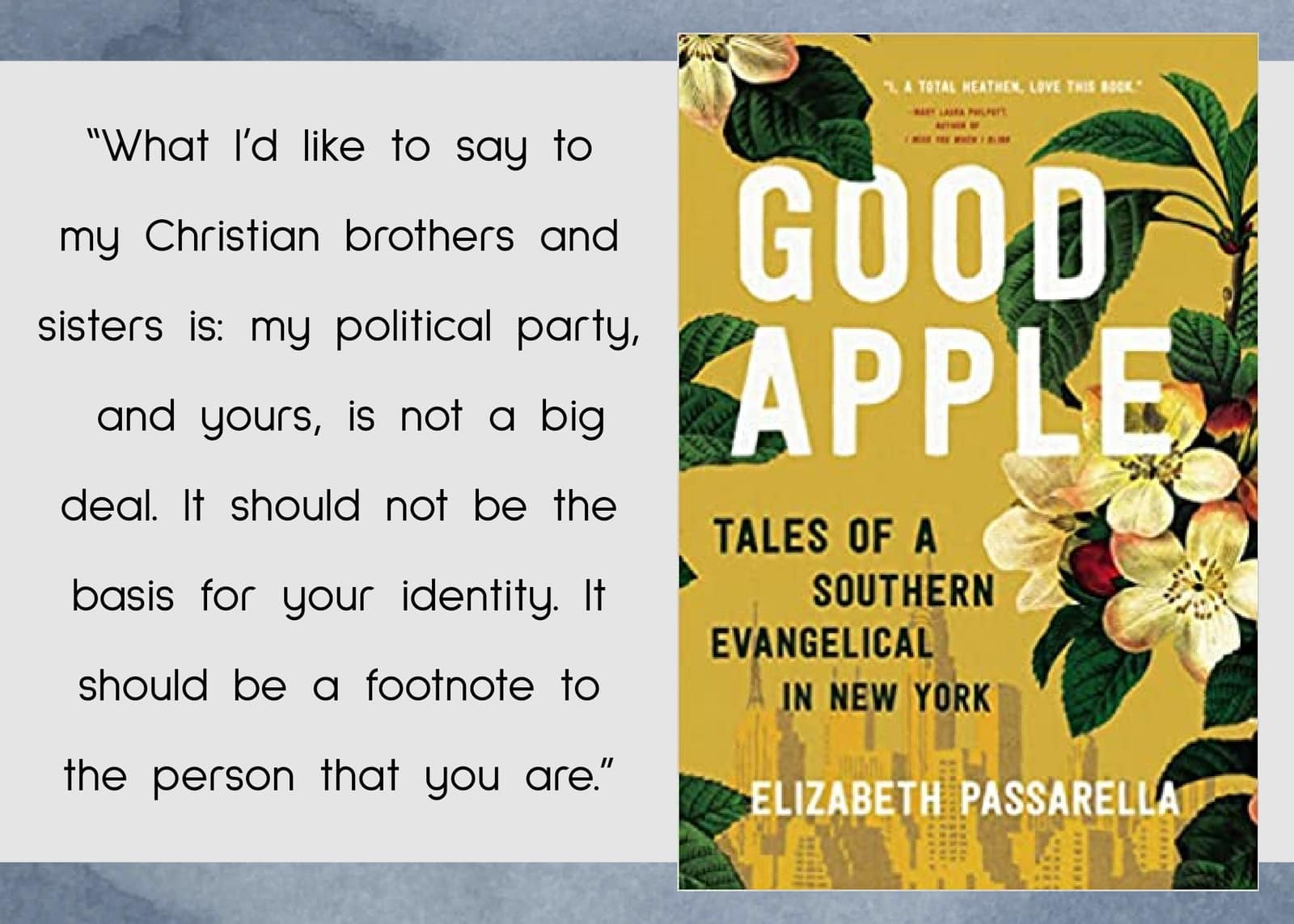
FICTION
Rock Paper Scissors, by Alice Feeney: Adam Wright has lived his whole life with face blindness, a neurological condition that means he cannot see distinguishing features on faces. In other words, he is incapable of recognizing people—even his own wife, Amelia. But the fact that Adam can’t see his wife’s face hasn’t kept him from loving her, or her from loving him. Every year on their anniversary the couple exchange traditional wedding gifts (paper, cotton, linen, etc.), and every year Adam’s wife writes him a letter she never lets him read—a letter documenting their past year of marriage including all the good parts, and some bad parts too. Because there is plenty of bad (and plenty of secrets) that she dare not disclose.
With their marriage on the rocks, the Wrights embark on a weekend getaway at a remote chapel in the Scottish highlands. But when Adam and Amelia arrive they quickly discover the getaway is not what was advertised. Trapped in an apparently haunted chapel and unable to get home, they must confront the truth of their marriage and themselves. There are no innocent parties here, and nobody is who they seem.
Alice Feeney is known for her killer twists, and this book is certainly twisty, but I’m not sure how killer it is. The premise is one I’ve seen done too many times now and I had much of it figured out early on. The unreliable narrator and face blindness component felt too gimmicky and unbelievable, and though I was engaged from start to finish (and especially intrigued by the themed anniversary letters and how they played into the story), I wasn’t particularly impressed and don’t know if the thriller is deserving of the hype.
A few things of note, one good and one aggravating: a lot of the story centers around writing, publishing, and the life of an author; I always enjoy reading about this subject and am curious about how much of her own experience Feeney wrote into this. Which leads to my point of annoyance, also writing-related: the style and voice here were too on the noise for me. Every few sentences we pause in the narration for a fortune cookie-type reflection: case in point, “time can change relationships like the sea reshapes the sand” and “sometimes the dust of our memories is best left unswept” and “believing in someone is one of greatest gifts you can give them, it’s free and the results can be priceless”—these ALL show up in the first couple of chapters, and that’s just a sampling. I actually do tend to like this sort of thing in my novels (a dose of philosophy mixed in with the fiction), but here it was overdone.
There is nobody to root for in this story, but plenty to keep you turning pages (and keep you up all night). If that’s what you’re desiring of your fiction now, this may be right for you. Otherwise, you can probably skip this one.
Book Rating: 3.5 Stars (Rounded down to 3 stars on Goodreads) // Book Format: Print
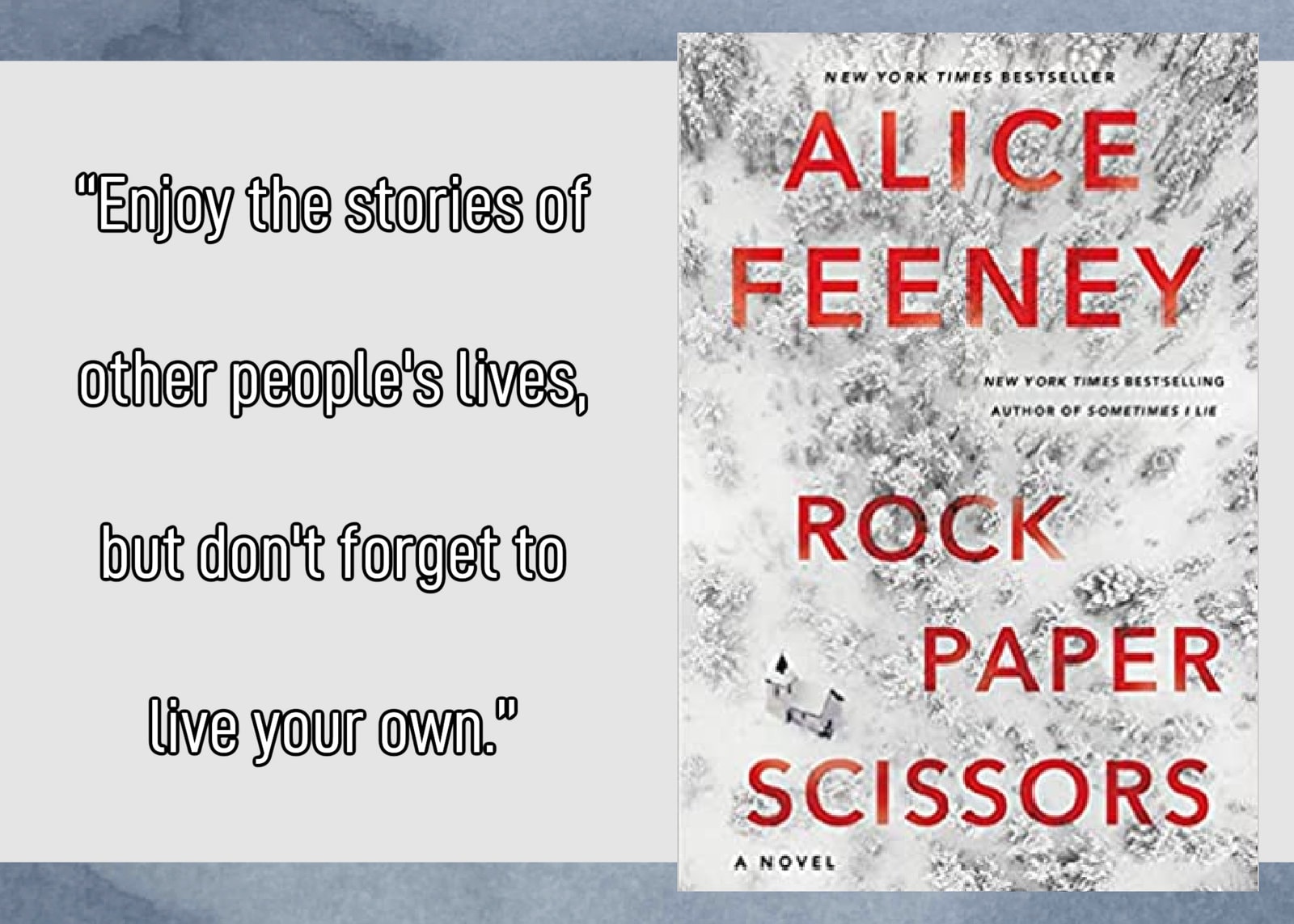
The One, by John Marrs: Since its beginnings a decade ago, Match Your DNA has completely transformed relationships around the world. Gone are the days of trusting one’s romantic life to chance; now, a simple DNA test is able to connect each individual with their unique Match, the one they were genetically made for. Once a man or woman meets his or her Match, sparks fly and genetic chemistry guarantees a lifetime of blissful love.
Match Your DNA has helped millions of people around the world find their soul mates, but the gene’s discovery and implementation has not been without its downsides. Countless relationships have come to an abrupt end as spouses leave previously-happy marriages in search of a guaranteed happier ending. And the euphoric marriages experienced by Matched couples has created an uncomfortable hierarchy of relationship statuses.
The One follows the stories of five individuals whose lives are upended when they learn they’ve been matched: there’s an eager twenty-something itching for excitement; a billionaire CEO who has been too married to her work to find love; a divorcée in her thirties who is desperate for a second chance at starting a family; a happily (so he thought) engaged man whose fiancé insists they try finding their Matches to be sure they are right for each other; and a serial killer who is more interested in murdering women than falling in love with them. Each story grows more and more high stakes as these five people discover the cost of love found and lost, and learn that even with one’s soul mate, the notion of happily ever after may be a myth.
Whoa, I had no idea what I was getting into with this book. The premise intrigued me, but I was expecting something more akin to Romance, not the Thriller-verging-on-Horror I was met with. This is one of the most propulsive books I’ve ever read: the quick chapters that alternate between the five main storylines (that don’t intersect at all) kept me turning pages, unable to turn away despite stomach-churning violence and more explicit, gritty sexual content than I care for. None of our protagonists are likable, and their lives are an absolute train wreck—which made for some very unpalatable but also intensely riveting reading.
Though largely plot-driven, the book also offers poignant commentary on the nature of love, romance, and relationships. And the premise provides some interesting thought experiments relating to life choices, predetermined outcomes, and societal vs personal obligation and satisfaction. I enjoyed thinking through the various ethical dilemmas presented in each story line (all VERY different).
This made for a really satisfying buddy read with my friend Cara, and it would be a perfect book club selection. While I won’t deny that it was probably too much for this sensitive reader to handle, I don’t (think I) regret reading it and know it will stick with me for a very, very long time. I’m also quite convinced I will not be signing up for any matching services any time soon!
My Rating: 4 Stars // Book Format: Kindle
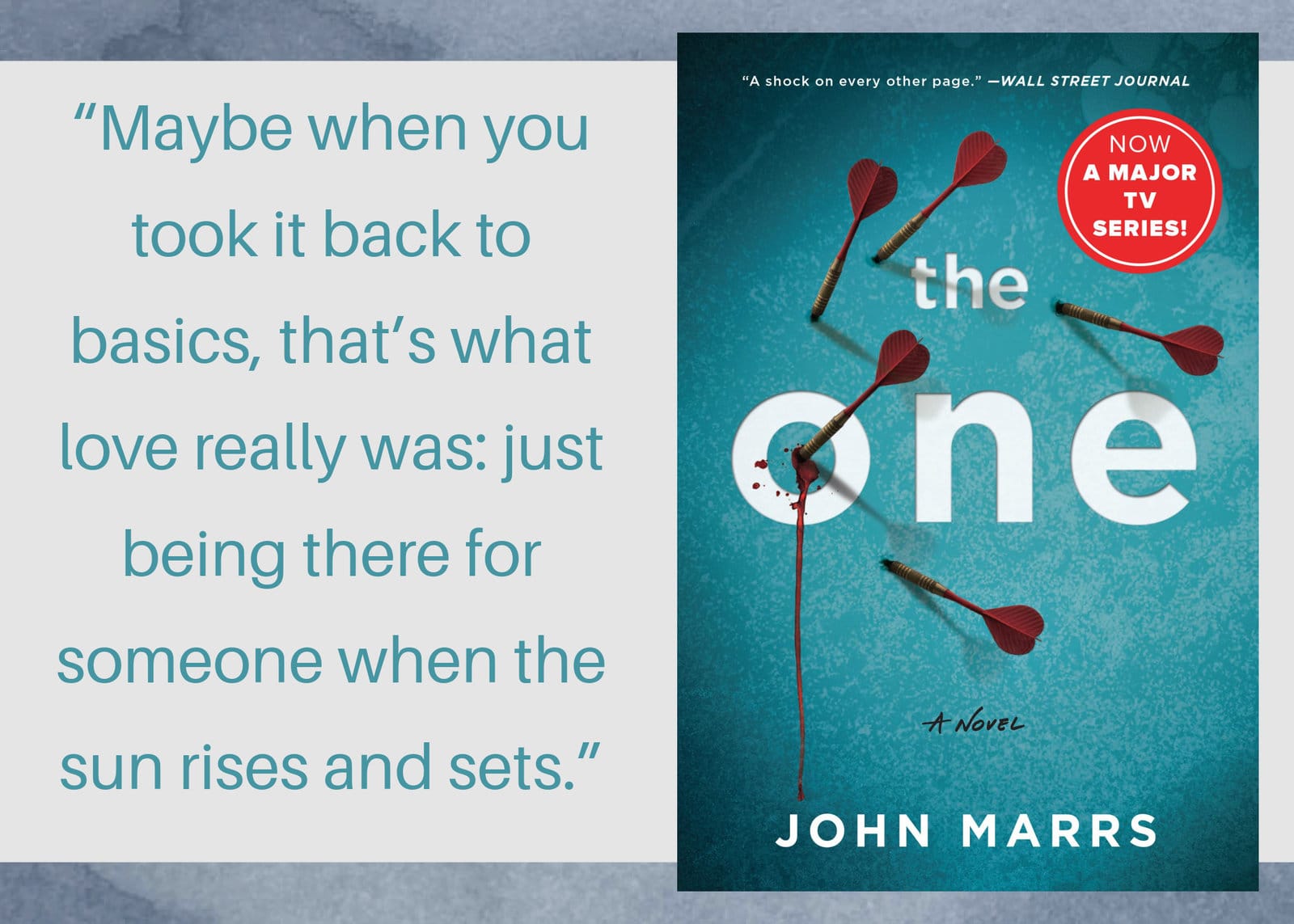
Nora Goes Off Script, by Annabel Monaghan: Nora is a single mom of two who works as a screenwriter for Hallmark-style Romance movies. Her most recent script brings the movies to her own (literal) backyard when the story she wrote about the collapse of her marriage is picked up for the big screen and is filmed on location at her 100-year-old home. Suddenly Nora finds herself swept up in a romance even grander than the ones she pens when Leo Vance—the Oscar winner (and former Sexiest Man Alive) who has been cast in the role of Nora’s ex-husband—requests to stay on for a few weeks after shooting wraps. Leo and Nora bond over sunrises viewed from her front porch, and soon Leo has worked his way into Nora’s heart as well as the hearts of her kids, friends, and neighbors. But this wouldn’t be a Romance without some disruption: some hearts must be broken before the credits roll, setting the stage for what we hope will be a beautiful Happily Ever After.
I liked this book, almost in spite of myself. The warm love story—with all of its small town comfort and heartwarming family vignettes, an endearing protagonist (who is just the right amount of quirky, relatable, and inspiring), and too-good-to-be-true (but so fun to imagine) star-falls-for-ordinary-person trope—made for an enjoyable vacation read that kept me reading (and swooning) so much that I forgot I should be rolling my eyes at its triteness. I’m not a Hallmark Movie fan, but I loved the premise of a scriptwriter’s romance and its glimpses into that world and into the Romance genre in general. I learned a lot about what goes into a decent love story and found the interweaving of Romance commentary with THIS story about a story (which revolved around movies Nora writes about her own life—all so very meta!) a lot of fun. There are clever insights into the life of a writer as well as Hollywood behind the scenes. The side characters, though not especially well developed, are also a delight: Nora and Leo’s many strong friendships and family connections make for a great celebration of love and loyalty.
There are some steamy scenes, but nothing too intense, and they are easily skimmed. Not so easily overlooked is the unimaginative prose. The writing style is very straightforward, and I found myself craving more dynamic sentence structure. Still, I can see why readers are going crazy for this book that gave me all the warm fuzzies. Kudos to the author for winning this reluctant Romance reader’s heart.
My Rating: 3.75 Stars // Book Format: Print
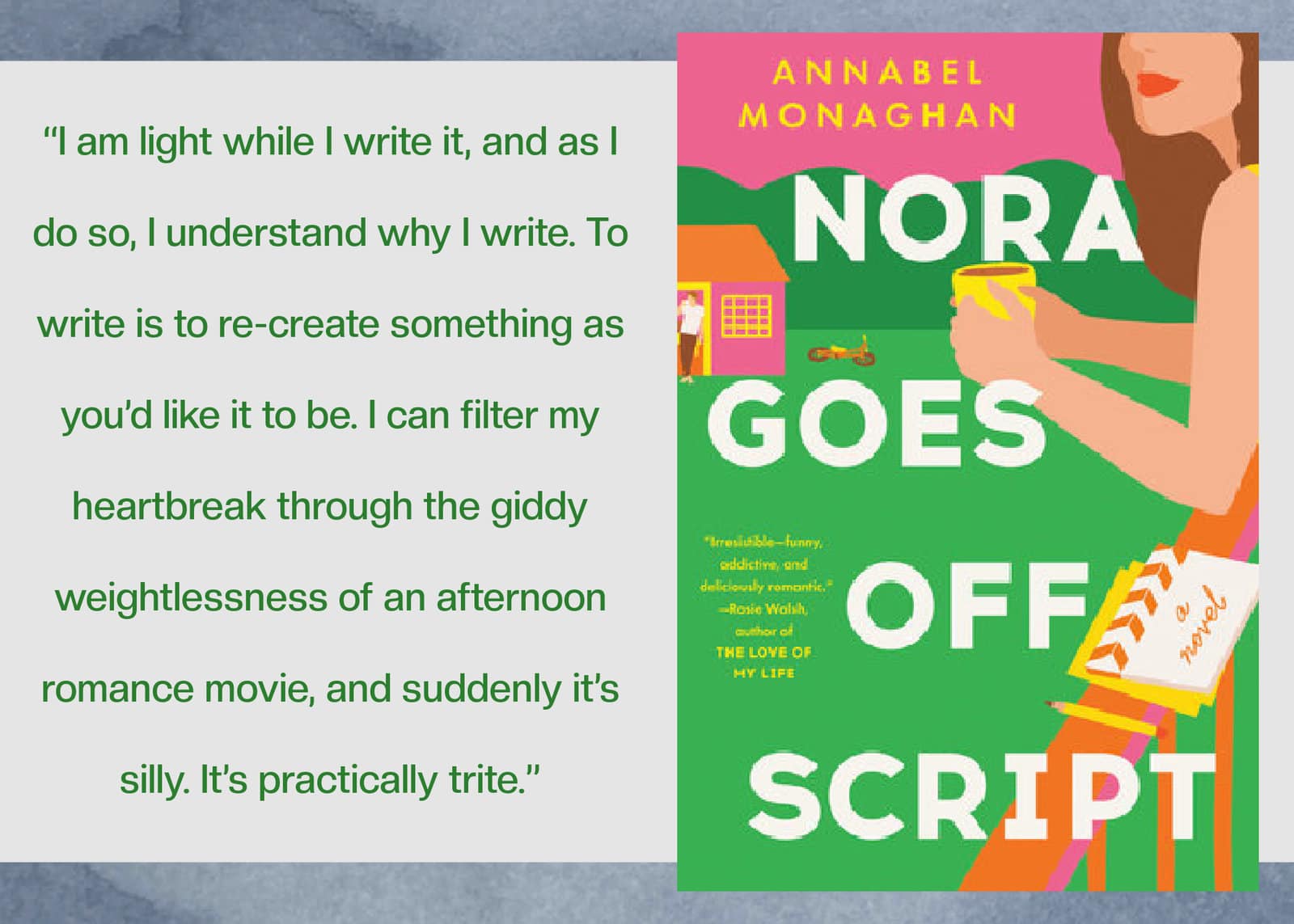
Moonlight on the Magic Flute (Magic Tree House: Merlin Missions Book 13), by Mary Pope Osborne: Annie and Jack have been given their latest mission. This one has them traveling to 18th-century Vienna, where they find themselves dressed for a party in an elaborate Austrian palace. Jack and Annie are tasked with finding a famous artist, but an annoying young boy named Wolfie keeps getting in their way. The siblings must use their magic to save young Wolfie from the palace zoo animals, and along the way they might encounter one of the greatest artists in modern history.
I read this one at the insistence of my seven-year-old, and I loved it! The book makes for a fun introduction to the life of young Mozart, and Charleston and I enjoyed listening to the music “inspired by” the story after reading. I’ve personally visited Schönbrunn Palace (where the story takes place) which made this one particularly meaningful.
My Rating: 4 Stars // Book Format: Print // Charleston’s Rating: 4 Stars
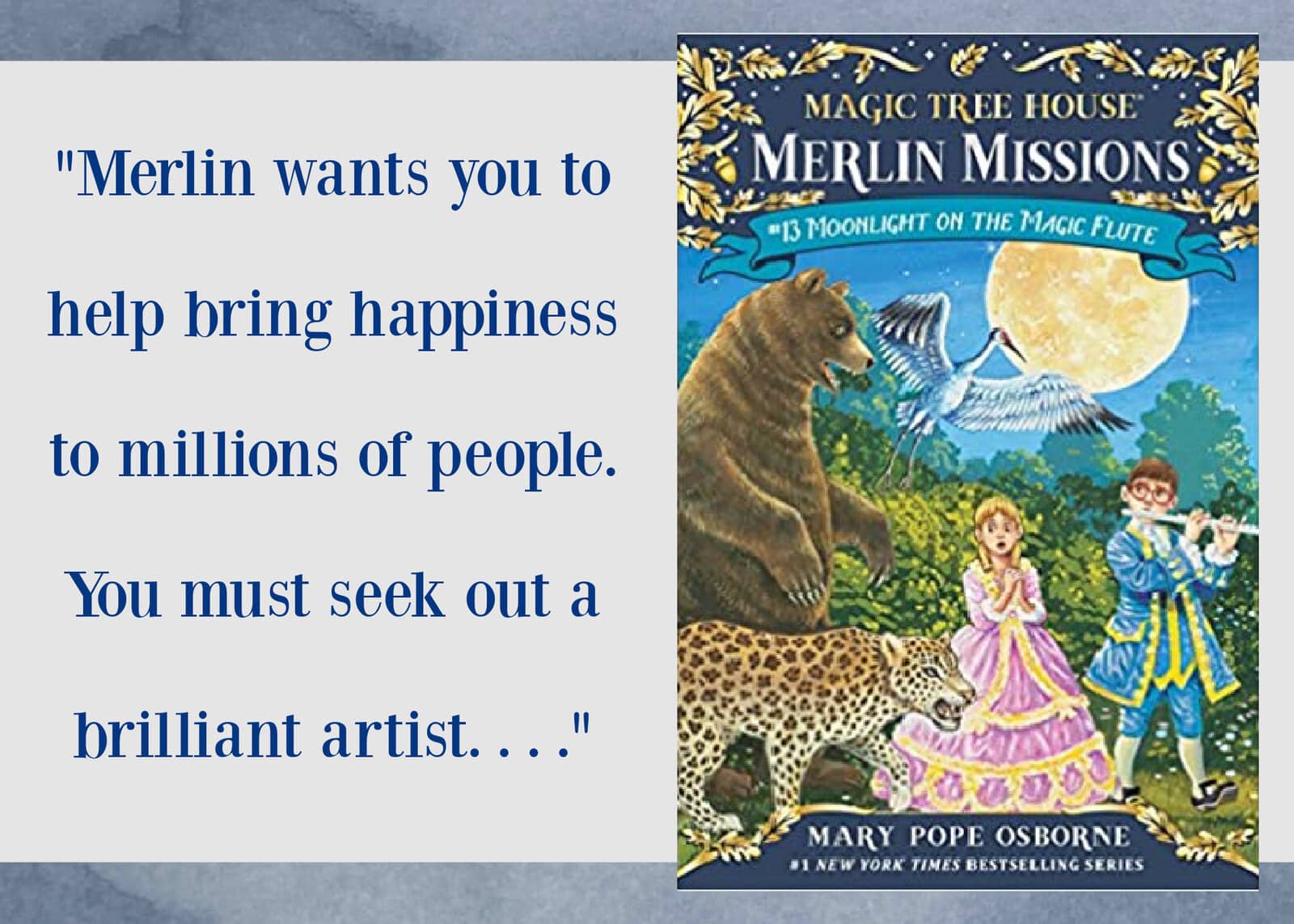
This Time Tomorrow, by Emma Straub: On the cusp of turning forty, Alice isn’t exactly unhappy, but she wonders if there could be more to life than her series of lackluster romantic relationships, her job as a private school counselor, and an intermittent relationship with her best friend Sam. Most of all, Alice wonders how she will keep on going when her ailing father—the only person who ever really loved her, her PERSON—passes away. When Alice falls asleep on her 40th birthday night and wakes up on her 16th birthday, she gets a chance to see what could have been. In this new/old life, her father is young again, and so is she. As Alice comes to terms with the reality of her time travel, she gains a new perspective on time, relationships, and what makes a truly meaningful life.
I’m always game for a time travel story and loved this one (even though the mechanics of this particular form of time travel left a few unexplained credibility gaps that bothered me). Alice’s father is a novelist famous for his book about time-traveling brothers, and Alice’s experiences cleverly intertwine with her dad’s expertise. I adored the fact that this was more of a father/daughter brand of love story—as well as an ode to lifelong friendship—and liked the unconventional but lovely dynamic of this father/daughter duo.
Alice’s 16th birthday (and therefore much of the book) takes place in the year 1996 (when I was twelve years old), so even though the setting (New York City) and Alice’s high school experience (as a worldly latchkey kid at an elite private school) was markedly different from my time as a straight-laced teen in a (conservative) California public school, I definitely related to the nineties references, as well as Alice’s observations on turning forty (which is coming up for me, too) and how one never quite feels their age. (See also: There Are No Grown-Ups, above.)
Explorations of aging, time, and purpose are key in this story and I appreciated the author’s thoughts. And I was intrigued by her commentary on social dynamics of New York City among high schoolers and NYC elite and a lot of what comes between. Straub is a perceptive observer of the human experience, and while I could have done without the profanity, sex, and excessive tobacco/drug/alcohol usage, I thought this was a great balance of intellectual and fun. Definitely a good book club selection, especially for the elder Millennials among us
My Rating: 4.25 Stars // Book Format: Kindle
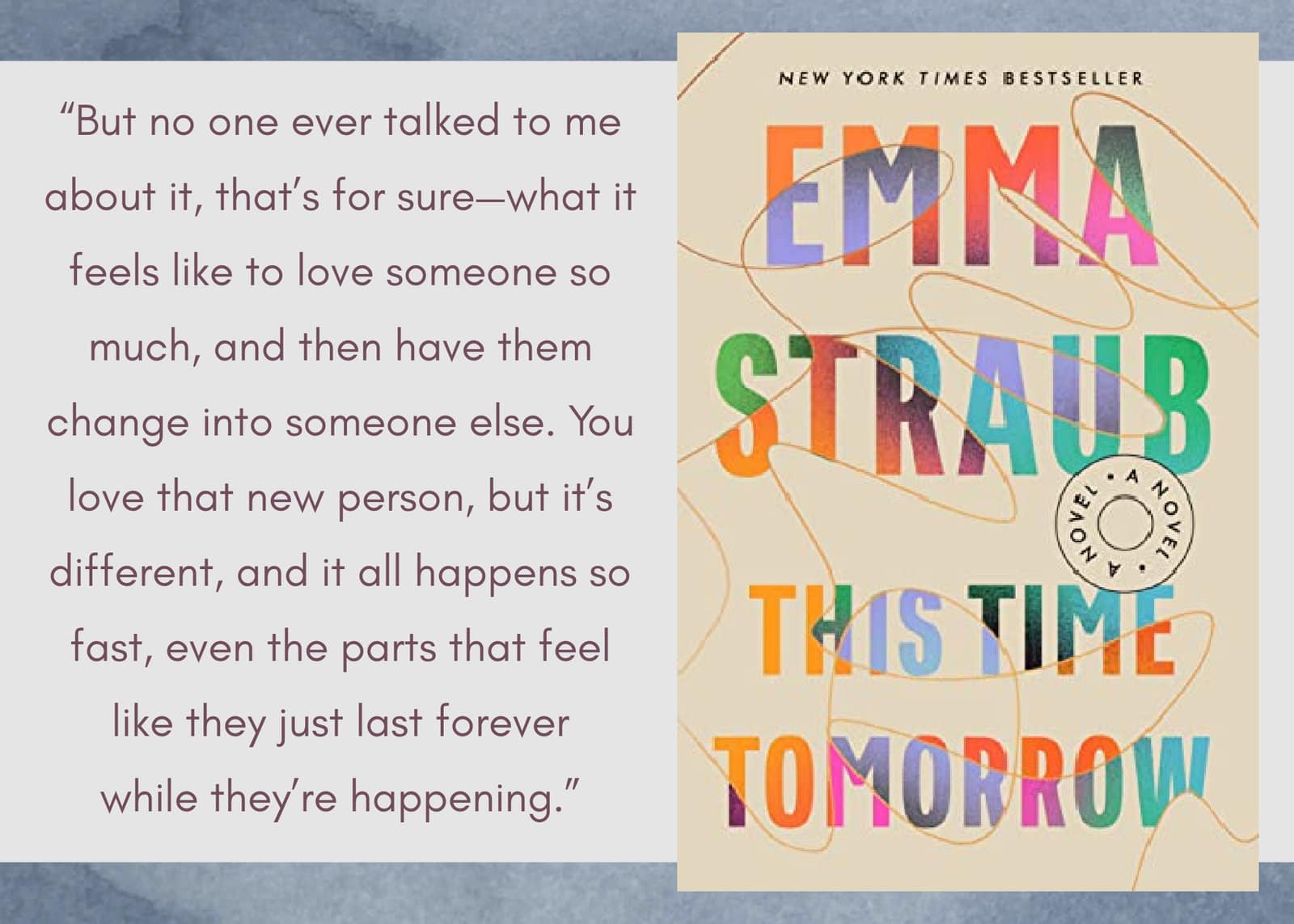
Meg, Jo, Beth, and Amy: A Modern Graphic Retelling of Little Women, by Rey Terciero: I picked up this title after spotting it at our library while looking for some graphic novels for Charleston (back before Charleston decided that he was “too grown up” for graphic novels . . . last month). I’ve become somewhat of a graphic novel fan myself in recent years and was eager to see how this modern retelling of a beloved classic may play out in this new format.
In this modernized version of Little Women, the March sisters are part of a blended biracial family being raised in Brooklyn by their hardworking mother while their father serves overseas in the military. The sisters are devoted to each other but rarely get along, and each March sister has her virtues and vices: the eldest, Meg, is nurturing but materialistic and obsessed with the idea of marrying rich; tomboy Jo is brilliant and a leader but headstrong and brash; Beth is sweet and loves music, though she struggles in social settings; and Amy, the baby, is a little too confident for her own good.
Over the course of one year, the family faces numerous challenges, from illness and poverty, to boy troubles, bullying, and identity woes. Through their trials the March sisters grow as sisters and as individuals as they learn how to love themselves and others, appreciate the most important things in life, overcome insecurities, and repair broken relationships.
This book was definitely a mixed bag. I really loved the premise and the author’s reimagining of these sisters, who are just as much of their own time as the original March sisters were of the Civil War era in which they lived. The urban setting and multicultural family worked well for this retelling and allowed the author to explore themes from the classic (kindness, generosity, gratitude, loyalty, humility, and feminine strength) in an updated way. I also really liked the art style, which isn’t always the case for me with graphic novels, and I enjoyed the mix of e-mails, journals, and comics to tell the story.
Despite its many strengths, this was ultimately a swing and a miss for me. Not only are these March sisters far less likable (read: much brattier) than the original Marches, but their family situation felt very forced. (As I said, I loved the fact that they were a biracial family, but their family’s backstory [Meg’s dad, who is Black, meeting and marrying Jo’s mom, who is white, and together having Beth and Amy] is repeated many times in many ways, and it got to be too much). Also bothersome was moralizing that was very on the nose; this is actually the case with the original Little Women, too, and I remember it being something that bothered me with that book when I read it; I was more forgiving of the pedantic tone in the original, though, as the YA genre was emerging then and plot was expected to take a back seat to moral instruction in books for younger readers. Today’s young audiences are more accustomed to subtle messaging, and the positive virtues could have been just as present without having to be so spelled out.
What troubled me more than the general preachiness, though, was the extremely heavy-handed agenda-pushing of progressive issues: classism, racism, LGBTQ matters, feminism, climate change . . . it’s all here, and more, and the virtue signaling (most notably Jo’s portrayal as a Lesbian and the amount of page time dedicated to her coming out) distracted from what could have been a very sweet and uplifting story for a modern generation of readers. I would not feel comfortable handing this to my own children, which is unfortunate because a graphic novel remake would have been a wonderful way to introduce them to this timeless family story.
My Rating: 2.5 Stars (Rounded down to 2 Stars on Goodreads) // Book Format: Print
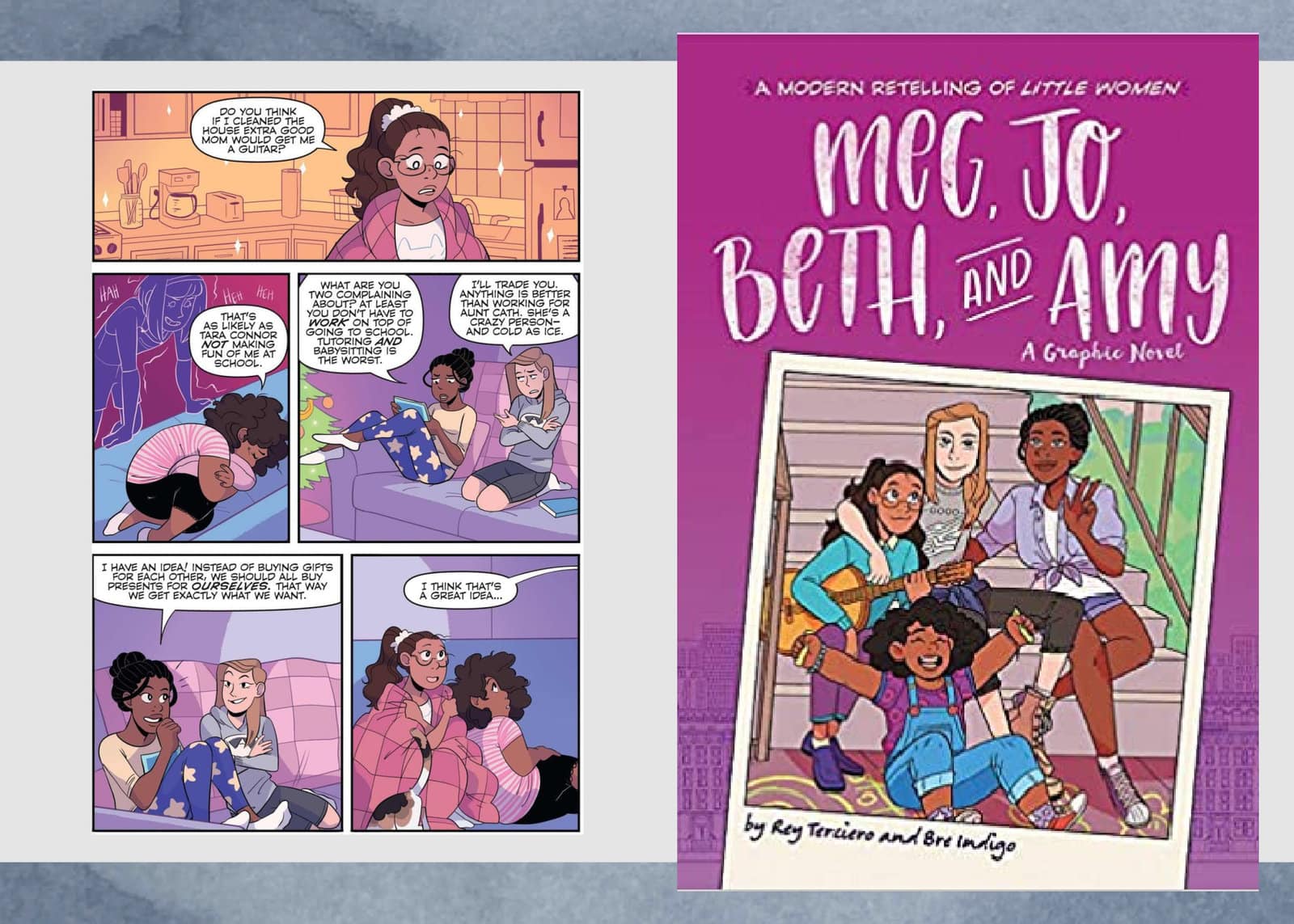
Have you read any of these books? Of course I’d love to hear your thoughts!
I typically don’t like time travel stories, but I did LOVE Kindred. So, I’m definitely curious about This Time Tomorrow because it has other parts to the story that I typically like. I’m finding that I don’t like the Little Women retellings much either. I guess I’m a traditionalist. 🙂
Kendra, good morning from Anne’s place! I think I picked up Good Apple and don’t remember finishing it … will check it out again. Thanks for the thoughtful reviews!